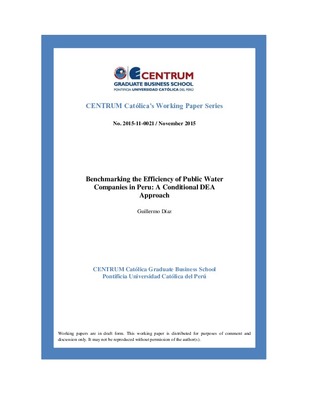| dc.contributor.author | Díaz, Guillermo | |
| dc.date.accessioned | 2019-09-03T00:14:39Z | |
| dc.date.available | 2019-09-03T00:14:39Z | |
| dc.date.issued | 2015 | |
| dc.identifier.uri | https://repositorio.pucp.edu.pe/index/handle/123456789/166805 | |
| dc.description.abstract | Benchmarking has been suggested as a useful regulatory tool for water companies in both developed and developing countries, specially due to the predominance of public firms in these sectors. However, in order to be effective, the comparison should be about credibly reflecting differences in the firms' performances, rather than capturing differences in their operating contexts. In this paper I apply a conditional data envelopment analysis (DEA) benchmarking technique that specifically controls for these different operating environments. As a result, I find that conditioning on the population density in each firm's area of operation affect the estimated efficiencies in a significant way. The results are consistent with previous findings in other countries (which use different methodologies), and are new in the case of Peru. | es_ES |
| dc.language.iso | eng | es_ES |
| dc.publisher | CENTRUM Publishing | es_ES |
| dc.rights | info:eu-repo/semantics/openAccess | es_ES |
| dc.rights.uri | https://creativecommons.org/licenses/by-nc-nd/2.5/pe/ | * |
| dc.title | Benchmarking the Efficiency of Public Water Companies in Peru: A Conditional DEA Approach | es_ES |
| dc.type | info:eu-repo/semantics/workingPaper | |
| dc.type.other | Documento de trabajo | |
| dc.subject.ocde | http://purl.org/pe-repo/ocde/ford#5.02.04 | |
| dc.publisher.country | PE | |
| dc.identifier.doi | http://dx.doi.org/10.7835/ccwp-2015-11-0021 | |


